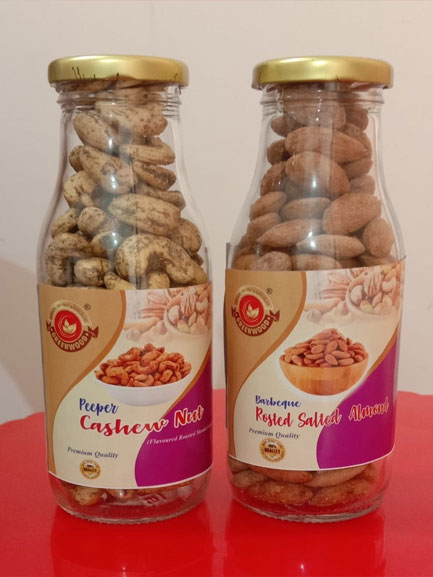
Cashew nuts, often simply referred to as cashews, are popular edible nuts that come from the cashew tree, scientifically known as Anacardium occidentale. These nuts are native to northeastern Brazil, but they are now widely cultivated in tropical regions around the world.
Here are some key characteristics and information about cashew nuts:
-
Appearance: Cashews are kidney-shaped nuts with a curved, smooth surface. They have a light beige or pale ivory color.
-
Taste: Cashew nuts have a sweet, buttery flavor, which makes them a versatile ingredient in both sweet and savory dishes.
-
Nutritional Value: Cashew nuts are a good source of several essential nutrients, including healthy fats, protein, fiber, vitamins (such as vitamin K, vitamin E, and B vitamins), and minerals (such as magnesium, phosphorus, and zinc). They are lower in fat compared to some other nuts, and most of the fat is monounsaturated and polyunsaturated, which is considered heart-healthy.
-
Uses: Cashews are enjoyed in a variety of ways. They are commonly consumed as a snack, used in baking, and incorporated into various dishes like curries, stir-fries, and salads. Cashew butter and cashew milk are also popular alternatives to traditional peanut butter and dairy milk.
-
Cashew Apple: The cashew tree not only produces the nut but also a cashew apple. The cashew apple is a pear-shaped fruit that is often juicy and can be consumed as is or used in beverages and jams.
-
Health Benefits: Cashews are believed to have several health benefits when consumed in moderation. They can contribute to heart health, weight management, and bone health due to their nutrient content.
-
Processing: One unique characteristic of cashews is that they are not sold in their shell because the shells contain a caustic resin that can cause skin irritation. Cashews must be roasted or steamed to remove this toxin before they are packaged for sale.
-
Allergies: Cashew allergies are not uncommon, and some individuals may experience severe allergic reactions to cashew nuts. Cross-contamination with other tree nuts is also a concern in the processing and packaging of cashews.
-
Culinary Uses: Cashews are versatile in the kitchen. They can be ground into a fine powder to make cashew flour for gluten-free baking, blended into creamy sauces or dressings, and used as a topping for dishes like salads or oatmeal. They are also a popular choice for making vegan cheese and desserts.
-
Storage: To maintain their freshness and prevent spoilage, cashews should be stored in an airtight container in a cool, dry place or the refrigerator.
Cashew nuts are not only delicious but also nutritious, making them a popular choice for a wide range of culinary applications. Whether you enjoy them as a snack or use them as an ingredient in your favorite recipes, cashews are a versatile and tasty addition to your diet.